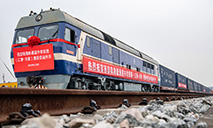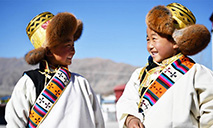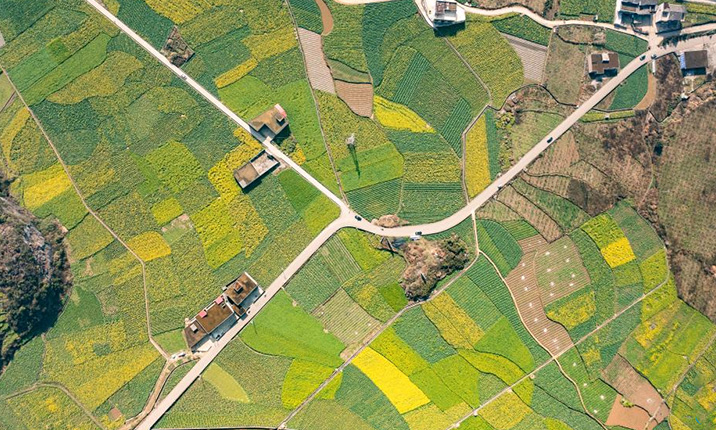Tashi Delek! Relocated Tibetan herders embrace new life
LHASA, March 3 (Xinhua) -- Thursday marked the Tibetan New Year. Three-year-old Gurum Drolma got up early in the morning, dressed in her new purple Tibetan costume, and went out with her family as they sent New Year greetings to their neighbors.
Gurum Drolma was born in June 2018. Her parents named her "Gurum," the name of their new hometown, to mark their relocation in the same year.
In June 2018, 262 households from Rungma, a township sitting at an average altitude of more than 5,000 meters in the city of Nagqu, southwest China's Tibet Autonomous Region, were relocated down to Gurum Township in the regional capital Lhasa.
"Gurum Drolma was born the day after we moved here. She is a child with a blessing," said 53-year-old Rigzin, Gurum Drolma's father.
Rigzin's family used to be herders. Before their relocation, a small television set and an electric butter maker were the only two electrical appliances in their house. As there was no telecommunication signal in the pastoral area, they had to travel 30 km to make a phone call or send a WeChat message.
Now, in their new two-story Tibetan-style residence, the family has access to tap water, and owns a refrigerator, a washing machine and a gas stove.
Due to the high altitude, harsh environment, frequent natural disasters and inferior public services, Rungma Township is not suitable for human habitation.
Long suffering from the environment, Gurum Drolma's mother, Karma Detso, suffered from Kashin-Beck disease, also known as "big bone disease." Three months ago, she underwent a knee replacement surgery.
"The new rural cooperative medical insurance covered 80 percent of the surgery cost," said Karma Detso, adding that they only paid 20,000 yuan (about 3,175 U.S. dollars) out of pocket for the surgery.
To bring more income to the relocated residents, Rungma Township has established Nyima Yanga Pasture Co., Ltd., raising more than 20,000 sheep and over 100 yaks on the grassland.
Tsering Tenzin, Party chief of the company, said in 2021 alone, the company generated 1.77 million yuan as dividends distributed to the residents.
Apart from the ecological compensation of 15,000 yuan per capita each year -- almost equivalent to their previous herding income, Rigzin's family has been granted 800 yuan in cash as dividends, as well as beef and mutton this year by the pasture company.
Villagers have also found jobs as airport terminal cleaners, railway line patrollers, and dancers and horse racers at a tourist resort near their new home.
Norglha, 32, works as a dancer at the Shangshung Metok ecotourism cultural resort, earning 3,200 yuan a month in summer. In winter, he returns to Rungma Township to herd cattle and sheep.
"I hope the resort can attract more tourists in winter so that I can have a stable income throughout the year," Norglha said.
The annual per capita income of the relocated residents increased from more than 11,000 yuan before relocation to over 19,000 yuan in 2021.
By 2020, Tibet had completed the construction of 964 relocation zones or sites for poverty alleviation in low-altitude and hospitable areas, where 266,000 impoverished residents were happy to resettle, read a white paper released in May last year.
Benefiting from the relocation and other measures, all impoverished people in Tibet have been lifted out of poverty together with those from the rest of the country.
In the following new year, Gurum Drolma will enter a kindergarten free of charge right at her doorstep. "I hope she can enter a university when she grows up, and become a doctor or teacher after graduation," said Rigzin.
Photos
Related Stories
Copyright © 2022 People's Daily Online. All Rights Reserved.










